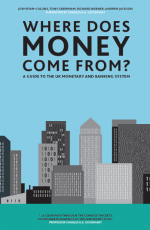Three Types of Money

There are three types of money in the economy, but as members of the public, we will have only ever used two of them – cash, and the numbers in your bank account.
1. Cash:
Physical money, or cash, is created under the authority of the Bank of England, with coins manufactured by the Royal mint, and notes printed by specialist printer De La Rue. The profits from the creation of cash (known as seigniorage) go directly to the government. Of course, it is inconvenient and risky to use cash for larger transactions. This is one of the reasons why today cash makes up less than 3% of the total money supply. Nowadays people use credit and debit cards, which allow money to be transferred electronically between bank accounts (see point 3).
2. Central bank reserves
Central bank reserves are a type of electronic money, created by the central bank and used by banks to make payments between themselves. In some respects they are like an electronic version of cash. However, members of the public and normal businesses cannot access central bank reserves, as they are only available to those organisations who have accounts at the Bank of England, i.e. banks. Central bank reserves are not counted as part of the money supply for the economy, due to the fact that they are only used by banks to make payments between themselves.
3. Commercial bank money
The third type of money accounts for approximately 97% of the money in circulation. However, unlike central bank reserves and cash, it is not created by the central bank or any other part of government. Instead, commercial bank money is created by private, high-street or ‘commercial’ banks, usually in the process of making loans (as described below). While this money is electronic in form, it need not be – before computers, banks could still ‘create money’ by simply adding deposits to their balance sheets.
Commercial bank money is referred to by various names, including: bank deposits, sight deposits, demand deposits, time deposits, term deposits, bank liabilities and bank credit.
For more details see:

Where Does Money Come From?
A guide to the UK Monetary and Banking System
Written By: Josh Ryan-Collins, Tony Greenham, Richard Werner & Andrew Jackson